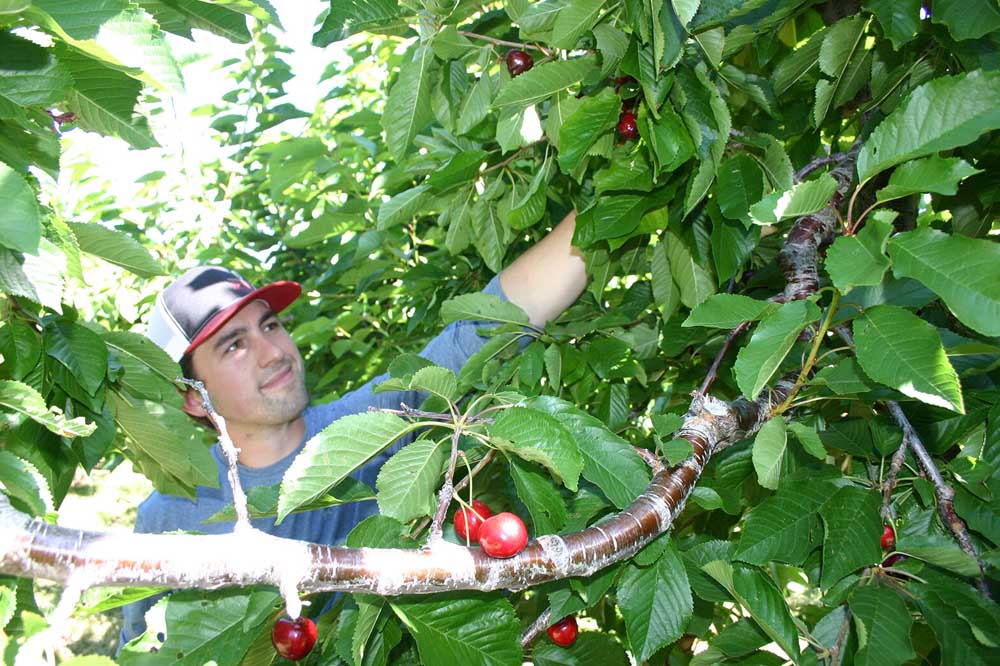Sweet harvest: Despite smaller cherry crop, Oregon producer touts ‘phenomenal’ quality
Published 2:00 pm Tuesday, July 26, 2022

- Kristoff Fowler, field and warehouse manager for Hood River Cherry Co., inspects a Skeena cherry tree that will soon be harvested. Fowler said the 2022 crop will be smaller than average, due to a “freak” mid-April snowstorm that disrupted pollination after trees had already bloomed.
HOOD RIVER — With cherry harvest in full swing across the Mid-Columbia Valley, activity was buzzing July 25 inside the packing house at Hood River Cherry Co.
Freshly picked cherries arrived in 220-pound bins from the orchard, where they are unloaded onto a conveyor and run through a hydro-cooler, which uses near-freezing water to slow down ripening and extend their shelf life.
From there, the conveyor splits into three lanes past rows of workers meticulously sorting cherries by hand, culling shriveled, cracked or otherwise damaged fruit. Cherries that pass inspection are then packed into boxes, labeled and brought into cold storage.
Kristoff Fowler, field and warehouse manager for Hood River Cherry Co., said this year’s crop is smaller than average due to an untimely snowstorm that blanketed the region in April, disrupting pollination after trees had already blossomed.
“Everything was at full bloom, bees were flying, and I woke up and it snowed 2 feet,” Fowler said. “Just a freak weather event.”
According to the USDA National Agricultural Statistics Service, U.S. sweet cherry production was forecast to be 275,000 tons in June, down 27% from 2021.
That includes a 19.5% decrease in Oregon, from 46,000 tons to 37,000 tons. A majority of cherries grown in Oregon come from the Mid-Columbia area, including Wasco and Hood River counties.
Though yield is undoubtedly down, Fowler said what this year’s crop lacks in volume it makes up for in quality, which he described as “phenomenal.” That’s because the tree is putting more energy into fewer cherries, resulting in bigger, sweeter, crunchier fruit.
“Instead of putting energy into 300 cherries, it’s doing maybe 150,” Fowler said. “The size of the fruit is just astronomical.”
Hood River Cherry Co. was started by Fowler’s parents, Brad and Katy, in 1993. Today, they have approximately 400 acres of orchards in the Hood River Valley, planted at varying elevations from 1,100 feet to nearly 3,000 feet.
Harvest in the lower elevation orchards began July 15. As the season progresses, fieldworkers will make their way to the higher elevation orchards — such as Bear Mountain, with its rolling hills and panoramic views of nearby Mount Hood.
It is here that Fowler said the farm faces another challenge. While fewer cherries on the trees does offer exceptional quality, it also means they ripen faster, shortening the picking window by several days before they spoil on the tree.
“Every orchard is timed by variety,” Fowler said. “Now all of that is getting compressed, and it’s getting harder to pull all the fruit off.”
To make matters more urgent, a blistering heat wave was in the forecast for the week, with Hood River expected to get five consecutive days of triple-digit temperatures.
Once the temperature exceeds 90 degrees, Fowler said they shut everything down to protect workers. If they are going go get all the fruit picked, he said crews will have to start earlier before it gets too hot. “As soon as it gets daylight, we get picking,” Fowler said.
To protect the fruit against extreme heat, Hood River Cherry Co. also installed overhead misters two years ago in orchards with varieties that are particularly susceptible to sunburn, including Rainiers, Skeenas and Lapins.
Fowler said the system is capable of lowering the temperature in orchards by 10 degrees, but must be used with caution. It has to be hot enough for the mist to evaporate before it touches the fruit, otherwise the cherries might absorb too much water and their skins will split.
“You can’t turn it on unless it gets to 100 degrees,” he said. “Last year, when we had our huge heat wave, those overhead (misters) really saved us.”
Even with a condensed timetable, Fowler said cherries are getting picked more or less on schedule. “You gotta be prepared for anything,” he said.
“Everything was at full bloom, bees were flying, and I woke up and it snowed 2 feet. Just a freak weather event.”
Kristoff Fowler, Hood River Cherry Co.








